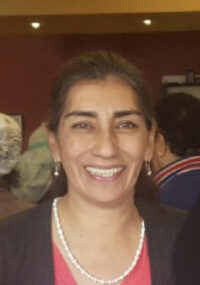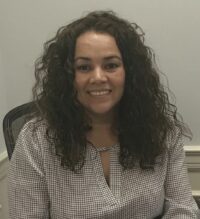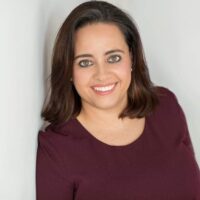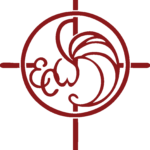Together in our diversity we make a difference!
By The Rev. Ema Rosero-Nordalm
 The story of Eva María Torres Herrera
The story of Eva María Torres Herrera
I was born in Mexico City, the second of three children. I am married. I have only one child, and I am a grandmother. I have a degree in business administration. For five years I worked in my profession. When my son was born, I started working as a teacher. I discovered that education is my vocation–one of my passions. I have worked as a teacher in middle school, high school, and college. I had the opportunity to work in one of the most avant-garde schools in my country. The Doctor Emilio Cárdenas University Center opened a range of knowledge, tools and possibilities for me.
In 2005, my husband, Octavio, was hired by an architectural firm in Northern Virginia. In July 2006, I immigrated to the United States with my 12-year-old son and two suitcases: in one were my books; in the other, some clothes. I was excited, remembering that like me, my paternal grandmother with her three children had emigrated to the United States in 1913. I arrived in this country as the song says: “With a suitcase full of dreams” and with the words of my mother: “Don’t forget your roots or your origin.” In 2008 we lost our immigration status by making the strongest decision of our lives and assuming what that entailed. Now I can see after 12 years that God always has a plan for us, that that plan is always perfect and that through that plan He is showing us the path that He has destined for us.
In 2010 my son’s hopes that the DREAM Act would allow him to study at university were dashed. The pain and the uncertainty of my son made me get involved and start following the DREAMers. I have always believed that education opens doors for us at all levels and allows us better economic opportunities. Maintaining hope and faith as every mother does and transmitting that confidence to our son helped him manage to achieve his dream. He is currently an architect after graduating from the Catholic University of America.
In 2013 I began to participate at the national level with the group of mothers called DREAMers’ MOMS. I started the chapter from Virginia, Maryland and DC, where I met a group of women and mothers that I admire and respect. I identified with each of their stories–with the pain and fear they felt of being deported and separated from their families. At the same time, I was encouraged by great faith and trust in God to fight for immigration reform.
That same year I met Father Daniel Vélez-Rivera of San Gabriel Episcopal Church in Leesburg, Virginia. I met him at a vigil that took place outside the offices of one of the congressional representatives, as an effort to win his support for immigration reform. Father Daniel has been one of the most important people in the history of DREAMers’ MOMS in Virginia and in my personal history as well. His initiative to offer informative workshops to his community is how I returned to my faith and the Church in particular with the confidence that I was welcome.
When there are no documents, a person does not feel the security of belonging. There is always an unconscious fear. When “you have not come out of the shadows,” as we say when you live without documents, you do not talk about immigration. Even if you know that you have rights, there is always fear in these moments of hatred, exclusion, and racism.
In 2015, when I was already actively participating in the San Gabriel Church, Father Daniel learned that I was a teacher. At the same time my inseparable friend Araceli Martínez learned that in Leesburg, VA there were a significant number of Latinos who could not read or write in Spanish. At that moment that suitcase full of dreams that traveled with me began to shape Educating with Love. Everything I had learned and the tools I had acquired in Mexico and with DREAMers’ MOMS could be used to help our community develop its leadership and the skills necessary to function in this society.
Different programs were organized for the church’s Latino ministry and for the Loudoun County Latino community. Right now, we are in Utah and Denver, Colo., where moms and kids are participating. We are guided by the message of the Episcopal community: “Everyone is welcome.”
The classes that we offer for boys and girls are classes where we teach life skills and reading and writing in Spanish. We complement their education by opening the range of possibilities through classes in emotional intelligence, brain gymnastics, math, art, and leadership, among others. In this way, we offer the children opportunities that many times they do not have due to various situations. And for parents we offer English and computer classes. During these pandemic months we have started virtual workshops offered by one of our science teachers: How to Take Care of Yourself During this Pandemic, School for Parents, nutrition classes, and community back-to-school talks.
I thank each of the volunteer teachers who have joined Educating with Love. Although not all attend our congregation, they feel a part of the community work that we offer. During this pandemic they have suggested many ways to keep in touch with children and families virtually. These families are also receiving a weekly pantry from the San Gabriel Ministry of Food and Social Justice. We share bread and bring hope to each family.
I believe that a people that prays, learns, shares bread and shares life is the bearer of good news, seeks justice and rests and grows in the spirit wherever and in whatever way they meet. May the Spirit bring us together to unite in community prayer and send us on a common mission for the People of God.
 The story of Isamar Ortega
The story of Isamar Ortega
Coming to the U.S. from Honduras five years ago has perhaps been the biggest challenge of my life. I had promised myself that, if they let me in, to feel safe with my youngest daughter I would be an independent woman who would help the community with all values and skills that I brought with me.
The day I arrived I said to myself: Well, here I am and I’m ready to start from scratch. I will take my daughter to school, look for a job and a church, and I will insert my best self into this new world.
One of my first failures was when I was told that I couldn’t obtain a driver’s license until my status changed. I spent more than a year often depressed, since I could not do anything that I had imagined. Not having a driver’s license made me dependent on other people. I felt useless. I felt that my wings had been cut off. After a period of time, I was able to get a driver’s license and it was like my wings had been given back.
From that moment my life changed. I began to do everything that I set out to do. I found a job. I found a church, where I served as a catechist for 2 years. I was still searching, though, because I still didn’t feel fulfilled. I watched everything and heard many people say: “For you to adapt to this country you will have to spend 10 years living here.” It scared me when I heard that. I said to myself: Why should I wait 10 years? Why not start now?
I came across an advertisement inviting the public to a meeting to fight for driver’s licenses for the entire Virginia immigrant community. I couldn’t believe what I was reading, but my soul told me that I should go. I knew what it was like to be without a driver’s license. If I could fight for all of us to have them, that would be really amazing! I was thinking of nothing more than to work for this opportunity for everyone.
I came to the meeting and realized that it was my chance to meet the members of the New Virginia Majority. I learned that it is an organization that fights for immigrants, people of color and the LGBTQ community to have equality, equity, and justice.
I started as a volunteer and–thanks to my passion and perseverance to fight for every person in our communities–I was offered a job as a community organizer. I couldn’t believe that they paid me to do what I love the most: help the community!
I vowed to empower my Latino community. I would help them find the tools they needed to live better. I would let them know that no one is alone: There are organizations that fight every day for our needs and our rights. In my job, I listen carefully and get what people need, whether it be a medical appointment if they are sick or a lawyer if they have an appointment in immigration court. Steady and dedicated work for driver’s privilege cards and driver’s licenses has paid off. A law was passed that will allow the entire Virginia immigrant community to obtain driver’s licenses as of January 2021.
In these moments of pandemic produced by Covid-19, we have reinvented ourselves. We know that many in our community are out of work, and they fear that they will be evicted from their homes. We are fighting to make rental programs more accessible to the most vulnerable individuals and families while the emergency lasts.
I met Father Daniel Vélez-Rivera at a meeting in which we shared the work we are doing with the immigrant community in the area. There I heard about the Episcopal Church’s work with the community and what he was doing. So I said to myself: I have to go to that church that works for the community. I thank Father and the San Gabriel Church for opening their doors and their hearts to me. San Gabriel Church does the work that God wants us to do: work with the community, with the most deprived, with the most vulnerable of His children.
As a mother and wife with my husband, we have many chores at home. We help each other as much as possible to feel good. My daughter Samara has seen community work from a very young age. Now at 18 she is studying at university and volunteering at the Loudoun Free Clinic. Her dream is to become a professional nurse and continue helping the community.
During this pandemic, my husband and I try to spend a lot of our free time serving the community. Together with Deacon Holly and other fellow Episcopalians, we have arranged to bring food aid and other items to those in need. All help comes to us from parishioners in our faith community and from other congregations. We receive abundance and we give from our abundance!
When I think of the work that Jesus Christ Our Lord did with the communities He encountered, I believe that He was the best community organizer and our inspiration to see and get to know ourselves and our neighbors more closely.
I will continue to fight for there to be more alternative spaces for education. I believe that an educated community is a thinking community with more opportunities to serve the world. Hopefully the day will come when we can achieve equality, equity and justice. In the Lord’s Prayer I hear what God wants us to do every day so that love always dwells in us.
 The story of Paula Callaghan
The story of Paula Callaghan
I am Paula Callaghan (Paula Patricia Morato Parada). I am Bolivian. I was born in the city of Oruro, in the beautiful highlands, and I grew up in the tropics of my country, the city of Santa Cruz de la Sierra. I attended Cardinal Cushing Catholic College as part of my school training. During high school, I actively participated in a social program led by the nuns of my school that consisted of training in useful trades for people with limited resources. We educate, offer literacy classes and teach basic skills that will help people who have limitations due to not being able to attend elementary schools and/or carry out university studies.
I actively participated in the world of Rotaract Grigota and Santa Cruz de la Sierra District 4690. These are community service clubs where weekly we had to develop and execute housing, food and other projects according to the needs of each village. I was chosen as the representative leader of this institution, where a lot is learned from service leadership and social help.
As for my university studies, in 1995 I entered Nur University in the city of Santa Cruz de la Sierra and graduated with a specialization in public relations.
In the course of my university studies, I was able to deeply learn the work involved in the area of social and human capital that is so important to be able to create, develop and implement shipping systems that are beneficial for societies.
In 2004 I came to the United States. I am a mother of two boys. I had the privilege of being a homemaker for 12 years while my children’s father went out to work. After that time I wanted to go back to the realm of the university and the theses that I had developed to obtain my degree. I went out to explore the market. I found Ms. Fuentes, a lead mom in Leesburg, Virginia, the city and state where I live. Through Ms. Fuentes, I was able to get to know the needs of the community–how they live, what challenges they have as parents living in a culture different from those of their homelands, how they raise their sons and daughters, what they lack in terms of education. In this way I got involved and worked to establish a school for parents.
With the arrival of Covid-19 and being an essential front-line worker for the public health system, I have realized how our Latino community lacks medical attention. I currently work for the free clinic in Loudon County, one of the wealthiest counties in this nation. I am in charge of the eligibility and outreach program in one of our new patient recruitment drives. In the second semester of 2019, we managed to reach around 150 in a population of 400 qualified inhabitants, of which 20% are Latino.
At the beginning of this stage of Covid-19 that we marked as March 11 because the county school system decided not to continue with face-to-face classes on that date due to this pandemic, we were forced to make an approximate projection of some 150 new patients who would be in need until the week of August 2021. We reached 323 new patients with a total of 971 active patients. The prior year in July we had a total of 604 active patients. The need is great!
As a born-and-raised Roman Catholic, I attended mass, but just attending was not enough for me. I was judged for not having married within the Roman Catholic religion. I was practically expelled because I was considered to be living in adultery.
I was always looking for an inclusive community that would welcome us and make us feel good about each other without having to judge each other. In 2017 S.L.B., a friend of mine, introduced me to Father Daniel Vélez-Rivera of San Gabriel Episcopal Church in Leesburg, Virginia. Since that day I consider myself and my children Episcopalians. We go to mass every Sunday (now virtual due to the circumstances), and I stopped going to my former church. Why? Because we Episcopalians in our diversity all make a difference!
This pandemic has taught us many lessons and has brought us even closer. My faith has grown a lot because I can continue to work with the most needy people. I can give them a space to grow with different options for social justice and equality, and I can be an instrument of guidance in those spaces.

